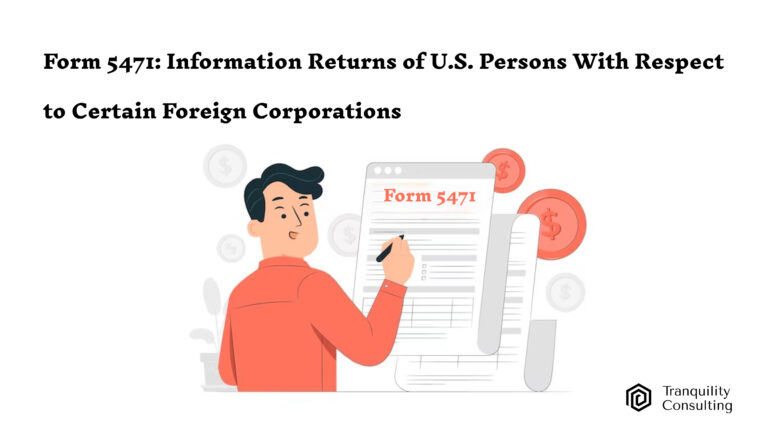Understanding and complying with the IRS’s international tax reporting obligations is crucial for U.S. taxpayers with ownership or directorship in foreign corporations. Form 5471, also known as the Information Return of U.S. Persons With Respect to Certain Foreign Corporations, is a key document that helps the IRS monitor U.S. involvement in foreign businesses. Filing this form is not just a formality—it plays a vital role in ensuring transparency, preventing tax evasion, and avoiding harsh penalties for non-compliance. This blog will break down the essentials of Form 5471, including when it applies, how to report, and the potential penalties for failing to file. Understanding the complexities of this form is crucial for maintaining compliance with U.S. tax laws and avoiding costly consequences.
What is Form 5471?
Form 5471 is an important IRS information return used by certain U.S. persons, including individuals, corporations, partnerships, trusts, and estates, to report their interest in foreign corporations. Suppose you are a U.S. taxpayer and own shares in a foreign corporation or are a director or officer of a foreign corporation. In that case, the IRS requires you to submit Form 5471 to disclose this relationship. This form allows the IRS to gain insight into the activities of U.S. taxpayers with ownership stakes in foreign businesses, ensuring transparency and compliance with U.S. tax laws. Failing to file Form 5471 when required can result in severe penalties, which is why it is crucial to understand whether it applies to you and how to complete and submit it correctly. The essential purpose of Form 5471 is to provide information on the foreign corporation’s financials, ownership structure, and transactions between the corporation and U.S. owners. While this form is primarily used for reporting purposes, it has significant tax implications, especially for those with large or complex holdings in foreign entities.
When is Form 5471 Applicable?
Not all U.S. taxpayers with interests in foreign corporations must file Form 5471. The obligation to file depends on the taxpayer’s filing category, which is determined by their level of ownership and role within the foreign corporation. There are five categories of filers:
- Category 1 Filers: U.S. shareholders of a foreign corporation, a Controlled Foreign Corporation (CFC). This category is primarily for those involved in Global Intangible Low-Taxed Income (GILTI) reporting.
- Category 2 Filers: U.S. citizens or residents who are officers or directors of a foreign corporation in which a U.S. person has acquired stock ownership equal to at least 10% of the corporation’s total voting power or value.
- Category 3 Filers: U.S. persons who acquire 10% or more of a foreign corporation, either through purchase, inheritance, or other means.
- Category 4 Filers: U.S. persons who had control (more than 50% ownership) of a foreign corporation for at least 30 consecutive days during the tax year.
- Category 5 Filers: U.S. shareholders of a CFC who owned shares for at least 30 consecutive days during the tax year.
Each of these categories has specific reporting requirements for Form 5471, and the complexity of the filing will depend on the filer’s category and the foreign corporation’s structure and financial activities. It is important to note that Form 5471 is required even if the foreign corporation does not generate income during the tax year. U.S. taxpayers who fall into the above categories must file the form annually, regardless of whether they have a taxable event.
Filing Deadlines:
Form 5471 is generally filed with the taxpayer’s U.S. income tax return (Form 1040 for individuals, Form 1120 for corporations), which means it is due on April 15.. Remember that the deadlines may vary depending on the taxpayer’s status and the filing category.
Regulation Information Requirements of Sections 6038 and 6046
Sections 6038 and Section 6046 of the Internal Revenue Code impose specific reporting requirements on U.S. persons involved with foreign corporations, further clarifying and expanding the obligations of Form 5471. Section 6038 mandates that U.S. persons who control a foreign corporation must provide detailed information about its financial position, including its income, expenses, and capital structure. This section is crucial for the IRS to evaluate the extent of U.S. taxpayers’ involvement in foreign operations and ensure compliance with U.S. tax laws.
Important points under Section 6038 include:
- Controlled Foreign Corporation (CFC): U.S. CFC shareholders must report certain information regarding the corporation’s financial activities.
- Reporting Requirements: U.S. taxpayers must disclose the foreign corporation’s name, address, and employer identification number (EIN), as well as details about its stock ownership and transactions with U.S. shareholders.
Section 6046 outlines the additional reporting requirements for U.S. persons who acquire stock in a foreign corporation. This section monitors ownership changes and provides the IRS with insights into the foreign corporation’s control and management structure.
Important points under Section 6046 include:
- Acquisition of Stock: The U.S. owner must report any stock acquisitions in a foreign corporation that exceed 10% of the total voting power or value.
- Information Required: Similar to Section 6038, Section 6046 requires reporting the foreign corporation’s name, address, and EIN, along with details of stock ownership and changes in ownership.
Both sections are integral to Form 5471 as they set forth the framework for what information needs to be disclosed. Failure to comply with these sections can lead to penalties similar to those associated with Form 5471 non-compliance.
What Are the Penalties for Failing to File Form 5471?
The penalties for failing to file Form 5471 or filing it incorrectly are severe. The IRS imposes automatic penalties for late or incomplete filings, which can quickly accumulate and result in substantial financial liability for taxpayers. The IRS has recently increased its focus on international tax compliance, which means that non-filing or late filing of Form 5471 is more likely to attract scrutiny. Therefore, it is essential to ensure compliance to avoid harsh penalties.
- Failure to File Penalty: If Form 5471 is not filed on time, the IRS imposes an automatic penalty of $10,000 per form for each year it is not filed.
- Continued Non-Compliance Penalty: If the taxpayer fails to file the form within 90 days of receiving a notice from the IRS, an additional penalty of $10,000 is imposed for every 30 days (or part thereof) the form is late, up to a maximum of $50,000.
- Accuracy-Related Penalty: If the information reported on Form 5471 is inaccurate or incomplete, the IRS may impose additional penalties, including 20% of the underreported tax. If the inaccuracy is due to fraud, the penalty increases to 75%.
- Reduction of Foreign Tax Credits: In addition to monetary penalties, failure to file Form 5471 may result in a reduction or disallowance of the taxpayer’s foreign tax credits, increasing the overall U.S. tax liability.
Conclusion
Filing Form 5471 is essential for U.S. taxpayers interested in foreign corporations. The form ensures transparency and helps the IRS monitor offshore activities to prevent tax evasion. With severe penalties for non-compliance, it is essential to understand the filing requirements and ensure accurate reporting. Working with a knowledgeable tax professional means U.S. persons can meet their obligations under Form 5471 and avoid costly mistakes. If you are a U.S. taxpayer involved with a foreign corporation, correctly filing Form 5471 is vital to complying with U.S. tax laws.
FAQs
1. Who needs to file Form 5471?
- U.S. persons, including individuals and entities with significant ownership or control in a foreign corporation, must file Form 5471.
2. What happens if I don’t file Form 5471?
- Failure to file Form 5471 can result in a $10,000 penalty, with additional penalties for continued non-compliance.
3. What does Form 5471 report?
- Form 5471 reports the foreign corporation’s financials, ownership details, and transactions involving U.S. persons.
4. When is Form 5471 due?
- Form 5471 is due with an extension of your U.S. tax return, typically by April 15.
5. What is a Controlled Foreign Corporation (CFC)?
- A CFC is a foreign corporation where U.S. shareholders control more than 50%, triggering Form 5471 filing requirements.
If you have any questions or need business-related tax consulting advice, please get in touch with us at: [email protected]





